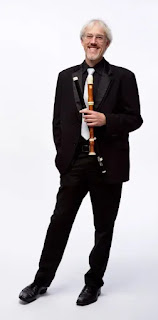Recorder player Matthias Maute lends mystery and magic to festival finale
A favorite recorder virtuoso and subtle showman here in the century's teens, Matthias Maute returned
 |
| Matthias Maute, eminent festival guest |
Sunday to front an all-star band of regionally active early-music instrumentalists for the finale of the 2023 Indianapolis Early Music Festival.
The concert invitingly promised "The Four Nations of Vivaldi" as a title designed to have the public think of Antonio Vivaldi's "Four Seasons," his set of wildly popular, much-recorded violin concertos linked to descriptive sonnets. But instead of increasingly unpredictable seasonal contrasts, the nations referred to spotlighted England, France, Spain, and India (also unpredictable then and now in the political sphere) in a manner that required the reconstructive ingenuity of Maute himself to amount to a highly selective musical gazetteer.
Each one of the concertos carried a prelude of national tone-painting, not by Vivaldi, designed to help call to mind the respective countries and some of their cultural attributes. The Basile Theatre of the Glick Indiana History Center was nearly filled to capacity for the concert, which was followed by a reception honoring retiring festival founder and longtime managing director Gail McDermott-Bowler.
Maute's skills as a composer and arranger were extensively applied in preparation of the program, which bore such authentic-sounding features of the "Red Priest" (1678-1741) that you would hardly know most of the original scores have been lost, according to Maute's program note. And though the baroque flute (traverso) and its end-blown relative the recorder have a few starring roles in genuine Vivaldi scores, their prominence as solo instruments in this program is an outgrowth of the leader's virtuosity and imagination.
The ensemble behind him Sunday included musicians well-known here and in Bloomington, many of whom have performed previously with Maute, a Canadian whose best-known associations internationally are with the ensembles Caprice and REBEL. Here his collegues were violinists Ingrid Matthews and Martie Perry, violist Allison Monroe, cellist Joanna Blendulf, violonist Philip Spray, harpsichordist Thomas Gerber, and guitarist Cameron Welke. The expert band was fully in step with him, especially in fast movements that had him nimbly negotiating passages relatively easier for violinists, in part because negotiating breath supply is not a factor for string players — no problem for the sublimely articulate Maute.
A buoyant prelude by Marc-Antoine Charpentier with the direction Sans frayeur (which Maute translated a la Bobby McFerrin as "don't worry, be happy") showcased the leader-soloist's warm timbre and lyricism as a traverso player. Then the first of the national concertos "La Francia" unfolded sans frayeur as a vehicle for solo recorder. The fast triplets in the opening Allegro were marvelously dispatched, and the Largo that followed had the solo instrument's plaintive quality confirmed in the chromatic, stately descent of the accompaniment.
Ornamentation of the solo line came to the fore in the Indian concerto, an individual potentate portrait titled "Il Gran Mogul." Maute took a rest for a Vivaldi string concerto played by his colleagues, which was introduced by Welke's solo, a corrente by Francesco Corbetta. Back at center stage, Maute and the band played Vivaldi's English concerto — a roast-beef-and-Yorkshire-pudding sort of piece, capped by a familiar-sounding "Tempesta di mare," evoking a phenomenon the seafaring nation often encountered as it navigated the world.
It was a return to the Mediterranean in the second half that opened with Maute's own "Primavera," including borrowings from Vivaldi's seasonal "Spring" concerto, followed by one of many variations on a hit tune of the era, Marin Marais' "Les Folies d'Espagne." The instrumental colors displayed here were astonishing, clear and vivid. It all amounted to a splendid introduction to the finale of "The Four Nations" — "Concerto La Spagne," with its imitation of castanets clicking just before the final movement.
To help settle the Wanderlust of the audience's ears, the concert concluded with a Vivaldi "largo" movement as calming postlude. Lest the sweetness be too lulling, Maute and the ensemble returned to England for an encore with an excerpt from "Concerto L'Inghilterra," introduced by the leader's shout of invitation "Let's meet in the pub!" and subsequent foot stamps judiciously applied to the instrumental frolic.



Comments
Post a Comment